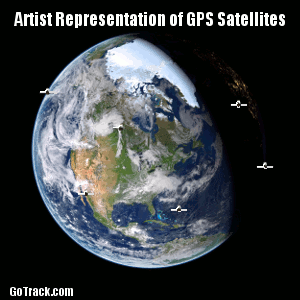[Question] Is There A New GPS System?
You may have read that the United States Air Force has recently accepted the first GPS III satellite from Lockheed Martin. Does this mean there is a “new” GPS system coming? The short answer is yes, but don’t worry! Your current trackers and navigation equipment will still work. Read on to learn what GPS III will mean for civilian global positioning satellite signal users.

The Current GPS System
In the United States, when you think GPS you are thinking of the Global Positioning System. This is a system of satellites, or a constellation, orbiting the Earth which were launched by the US government. At any time there are at least four satellites over any point on the planet. Each satellite broadcasts low energy radio signals. Specialized receivers listen to these signals, determining their strengths and which satellite sent them. The receiver uses this information to calculate its position relative to the satellite constellation.
Position data can be combined with map information for navigation or tracking. The GPS signal also provides clocking information to receivers. This is a very simple, but accurate, summary of the GPS system. Today, “GPS” is often used to describe many tracking systems. However, if they use Bluetooth or cellphone signals to figure position instead of the Global Positioning System constellation they are not a GPS system.
Other GPS Constellations And New Systems
The current GPS constellation has been fully operational since 1995. The first satellites were launched in the 1970s. The GPS system was designed to accept new satellites to insure continuous service as equipment wore out. Today’s working GPS satellites were launched between 2000 and 2016. They were designed with a 12 year lifespan. Since the US launched the GPS constellation, other countries have launched their own equipment. For example, Russia has a system called GLONASS and Europe operates the Galileo Positioning System. China, Japan and India all have satellite positioning constellations as well.
The US Congress authorized developing a new, upgraded system, referred to as GPS III, in 2000. It was planned to launch the first GPS III device in 2014. Unfortunately, there were technical delays and the initial launch has been postponed for years. In October, 2017 the US Air Force announced it had officially approved the first GPS III satellite for service. This clears the way for the Lockheed Martin built satellite to launch in 2018. The new satellite design brings not only several new features but a 15 year service life.
The GPS III Upgrade
For users of GPS trackers and navigation systems, the most important thing about the new constellation is that it will continue to broadcast the current signal. This means that the GPS device you are using today will continue to operate. The GPS III constellation also adds new signals. One signal will be compatible with certain other constellations, such as Europe’s Galileo system, to provide greater connectivity for future GPS devices. Additional civilian signals will be added to increase the flexibility of the overall system. The GPS III upgrade will also improve upon the military only signals sent from the constellation to improve accuracy and reduce the effectiveness of GPS jamming. The GPS III constellation is not expected to be operational until at least 2020.
The new constellation of GPS III satellites will effectively launch the next generation GPS system. As self driving cars and autonomous robots become more common, the GPS III constellation will undoubtedly help guide these technologies into the future.